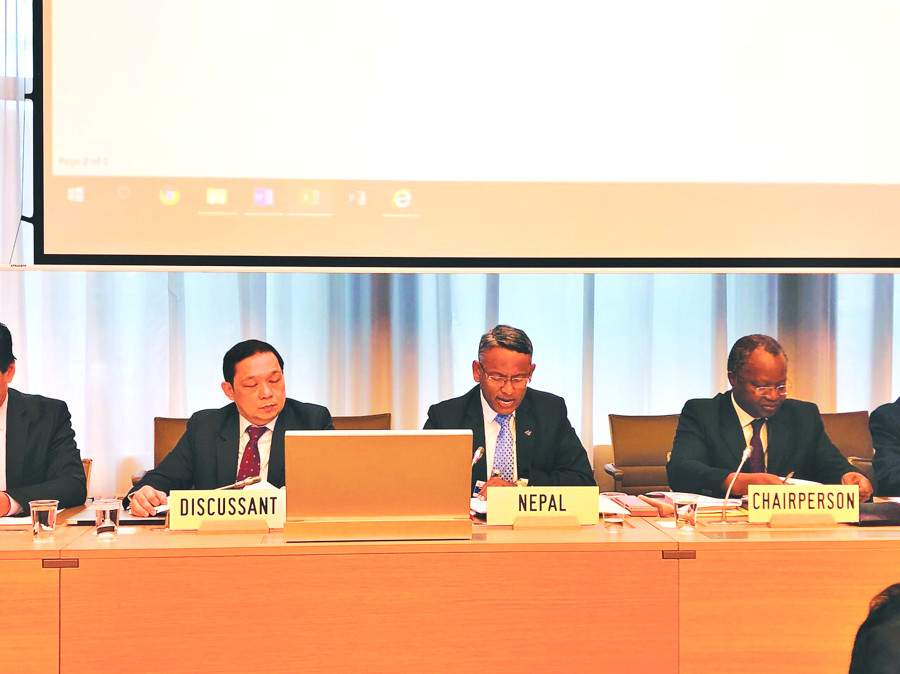Money
Nepal gets poor marks at Trade Policy Review in Geneva
The World Trade Organisation criticised Nepal for slow progress in formulating and implementing legal frameworks for different types of trade policies and intellectual property rights to boost its production and trading capacity in the global market.
The World Trade Organisation criticised Nepal for slow progress in formulating and implementing legal frameworks for different types of trade policies and intellectual property rights to boost its production and trading capacity in the global market.
The intergovernmental organisation pointed out in its secretariat report prepared during the second Trade Policy Review (TPR) of Nepal that this was expected to become a barrier to expanding the country’s trade.
“Despite a major transformation in institutional and regulatory arrangements, the key development objectives and related laws remain largely the same as in 2012 when the first TPR was done,” states the WTO report released in Geneva, Switzerland on Monday.
A Nepali delegation led by Commerce Secretary Chandra Kumar Ghimire is currently in Geneva to take part in the TPR meeting that started on Monday. This is the second review of Nepal’s trade policy since it joined the WTO in April 2004. The first TPR was done in 2012.
TPR is a mandatory component for member countries of the WTO under which they need to revisit their trade policy at specific intervals. As per WTO rules, the trade policies of the least developed countries need to be reviewed every six years. The trade policies of the developed and developing countries are reviewed every two and four years respectively.
Nepal cited its long drawn political instability for its inability to promptly enforce the necessary laws to boost the trading environment. The WTO Secretariat expressed concern over the bill on safeguards, anti-dumping and countervailing measures that is yet to be presented in Parliament.
“In other cases, the laws may have been passed, but the implementing regulations are still being drafted. Moreover, in some cases, where the laws and institutions are in place, there is little data on enforcement, such as the laws relating to intellectual property rights, government procurement and competition policy,” the report said.
Nepal has ratified the Trade Facilitation Agreement and the Protocol Amending the TRIPS Agreement. However, it is not yet a participant in the Information Technology Agreement, nor a party to the Government Procurement Agreement or its revision. Despite efforts to meet WTO notification requirements, many are still outstanding, including some relating to subsidies, domestic support for agriculture, services, customs valuation and import licensing procedures.
The WTO pointed to the declining contribution of the manufacturing sector in the country’s Gross Domestic Product (GDP). As per the intergovernmental organisation, the contribution of manufacturing to the GDP steadily declined during the last decade to 5.4 percent in 2017-18 due to low labour productivity, high transport costs, production stoppages due to electricity cuts, and poor labour-employer relations leading to strikes.
The WTO expressed concern over the poor implementation of the regulations to enhance market competition. Nepal endorsed the Competition Promotion and Market Protection Act 2007 and its Implementing Regulation 2010 which prohibit anti-competitive agreements, abuse of dominant position, mergers and amalgamations with the intent of restricting trade, bid-rigging and other anti-competitive activities.
The legal and institutional framework is in place, but the act has never been used to prosecute a case. Alternative laws are being practised in about 30 various competition-related cases.
Due to the slow progress in removing supply constraints, Nepal has been facing an ever widening trade deficit. According to the Trade and Export Promotion Centre (TEPC), Nepal’s trade deficit ballooned to Rs454.47 billion in the first four months of the current fiscal year, due mainly to an immense import bill compared to a nominal rise in export earnings.
Presenting Nepal’s TPR report on Monday, Secretary Ghimire said that the country was moving to fulfill its commitments to the WTO. During the review process, nine WTO members made 137 queries related to the improvement status of Nepal’s trade related environment. Nepal furnished answers to 128 queries, according to a press statement issued by Nepal’s Permanent Mission to the United Nations.




 14.24°C Kathmandu
14.24°C Kathmandu














